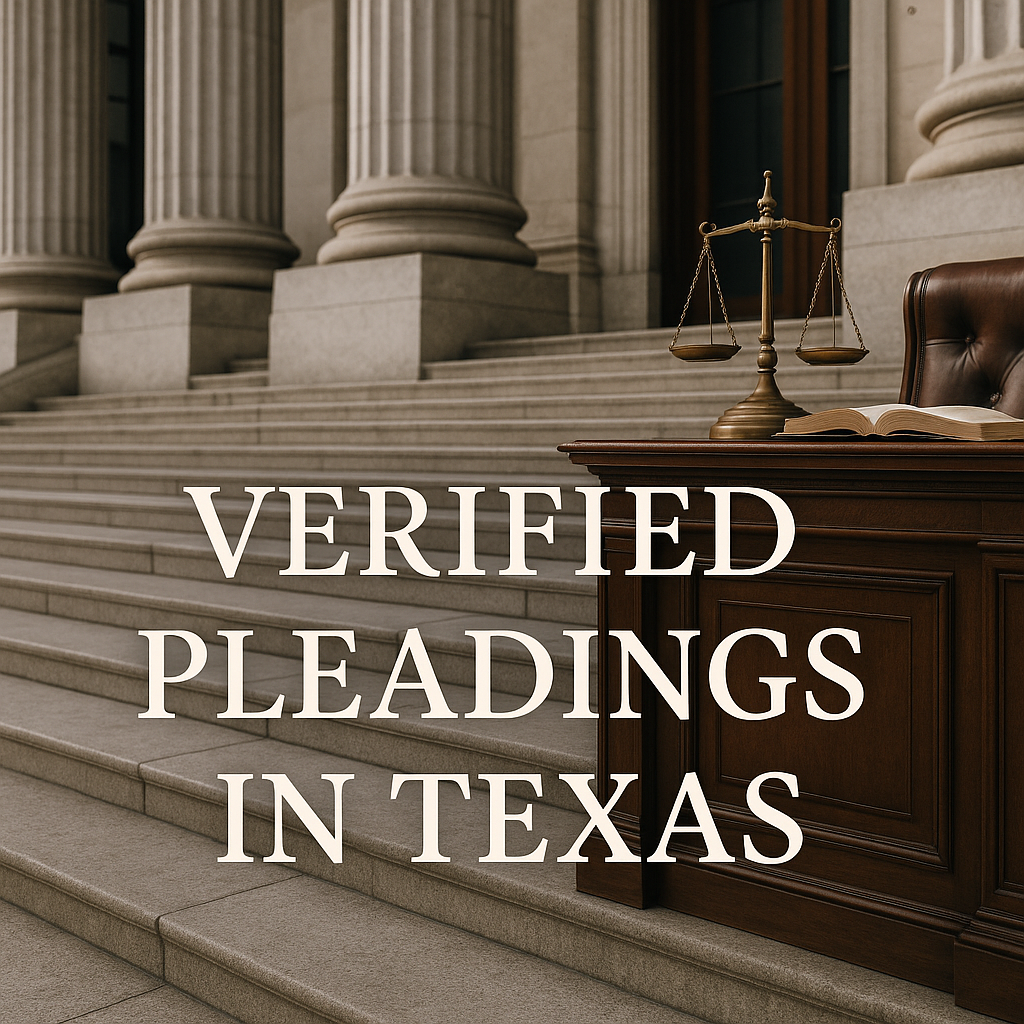
In Texas civil practice, most pleadings need not be verified—that is, sworn to under oath. But there are important exceptions. Knowing when a verified pleading is required can make or break a case. Failing to verify when necessary can render a pleading defective, subject to special exception, or even strike an entire defense or claim.
What Is a Verified Pleading?
A verified pleading is one that includes a sworn statement by the party (not just the attorney) attesting to the truth of the factual allegations. It’s essentially a declaration under oath that the contents of the pleading are true and correct to the best of the party’s knowledge. Verification is typically accomplished through a notarized affidavit or an unsworn declaration under Texas Civil Practice & Remedies Code § 132.001.
The General Rule: Pleadings Are Not Verified
Under Texas Rule of Civil Procedure 45, pleadings need only be in writing, signed by counsel or the party, and state a cause of action or defense in “plain and concise” language. Verification is not the default requirement.
However, certain pleadings, motions, or defenses mustbe verified by rule or statute.
When Verification Is Required
Verification is expressly required in several key situations:
- Denying the Execution or Assignment of a Written Instrument
Under Rule 93(7), if a party wishes to deny signing or authorizing a written instrument on which the other side’s claim is based (like a promissory note, contract, or deed), the denial must be verified. - Denying a Sworn Account
Under Rule 185, if a plaintiff sues on a sworn account (such as for goods sold, labor performed, or an open account), the defendant must file a verified denial to contest it. Otherwise, the account is taken as prima facie evidence of the claim. - Denying the Capacity in Which a Party Sues or Is Sued
Under Rule 93(2), challenges to capacity—such as denying that a plaintiff has legal capacity to sue, or that a defendant is properly named or exists—must be verified. - Denying Partnership, Corporation, or Agency Allegations
Rules 93(4) and 93(5) require verification when denying that a party is incorporated, is a partnership, or that an individual acted as an agent. - Pleading an Account as Just and True
If you’re asserting a claim for an open account or sworn account yourself, you must verify it with an affidavit stating that the claim is just and true, the goods or services were delivered, and the amount is unpaid. - Plea of Privilege and Certain Venue Challenges
Some venue or jurisdictional pleas historically required verification (e.g., Rule 86). While modern practice often allows broader use of evidence, older venue and privilege rules still require a sworn statement of truth. - Applications for Temporary Restraining Orders or Injunctions
Injunctive relief under Rule 682 must be verified—either by affidavit or sworn petition—because the court must rely on sworn facts to issue extraordinary relief. - Affidavits of Inability to Pay Costs (Pauper’s Oaths)
Under Rule 145, an affidavit of inability to pay costs or security must be verified to be effective. - Certain Family Law and Probate Filings
Statutes in the Texas Family Code and Texas Estates Code require verification for specific filings, such as inventories, motions to enforce possession or child support, and applications for temporary administration.
Why It Matters
A pleading that requires verification but is not verified is defective as a matter of law. Courts may strike it on motion, sustain special exceptions, or disregard it entirely. Conversely, over-verifying (swearing to matters that are purely legal argument) can be risky if the statements prove inaccurate.
Best Practices for Lawyers
- Review Rule 93 and Rule 185 carefully before filing denials or defenses.
- Use unsworn declarations under CPRC § 132.001 for convenience; notarization isn’t always necessary.
- Verify only factual matters that require it—not legal conclusions.
- Double-check supporting affidavits for form and execution, as an invalid verification may be no verification at all.
Conclusion
Verification requirements are technical but essential. In Texas, an otherwise solid pleading can collapse if not properly verified. Whether you’re defending against a sworn account, challenging a contract signature, or seeking injunctive relief, take the extra step to ensure your pleadings meet all verification requirements.
At David C. Barsalou, Attorney at Law, PLLC, we help clients navigate business, family, tax, estate planning, and real estate matters ranging from document drafting to litigation with clarity and confidence. If you’d like guidance on your situation, schedule a consultation today. Call us at (713) 397-4678, email barsalou.law@gmail.com, or reach us through our Contact Page. We’re here to help you take the next step.